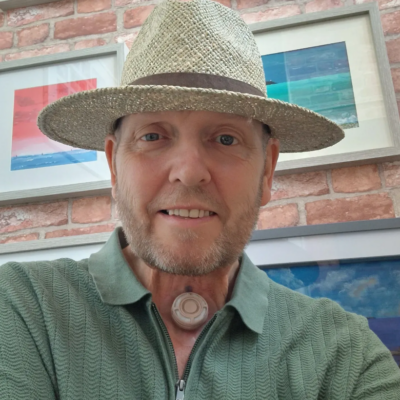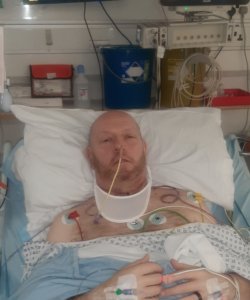Jon lives in South London. He is married, with four adult children and 11 grandchildren. He is a consultant in construction and Health and Safety, and a trainer in Equity and Diversity. In late 2022, aged 57, Jon was diagnosed with Stage 4 laryngeal cancer.
How was your cancer diagnosed?
I had been having issues for many months with my pancreas. A PET scan came back negative for cancer but showed upper right lobe emphysema. I was prescribed steroid inhalers but then developed a hoarse voice. While at a check-up appointment, the breathing team told me it was a side effect of the inhalers and gave me an inhaler spacer to help with this. The hoarse voice stayed and gradually got worse until I could only whisper. I went back to the doctors who referred me to a specialist.
I then attended a clinic where I was immediately diagnosed with laryngeal cancer (cancer of the voice box). Tests and scans then showed the cancer was Stage 4 and in the thyroid gland.
 What treatment did you have or are you having?
What treatment did you have or are you having?
A total laryngectomy was the only course of action: with 84 lymph nodes and the thyroid removed too. I would forever breathe through a neck stoma (a permanent opening in the neck that allows people to breathe after a laryngectomy).
This was also followed up with 30 doses of radiotherapy and 2 cycles chemotherapy.
Not something I had planned at 57.
My surgery was 9th January 2023 and lasted 11 hours, followed by a 14-day hospital stay. I had to learn how to breathe, eat, swallow and talk again. Everything we take for granted was a daily challenge. The Speech And Language Therapy (SALT) team Jess, Rosie and Sally who taught me all of that were with me every step of the (very nervous) way. The surgeons took away my cancer but it was my speech and language team that gave me my life back.
The other hospital and staff were also amazing. My surgeon is a wonderful guy who helped me a lot and the team on the ward were fantastic. I was so well looked after.
What was your experience of radiotherapy?
 Radiotherapy was barbaric; I swear it almost killed me. I slept most of the time, even in the waiting room, and adding chemo on top of that was extremely unpleasant. I know that it was a means to an end, but wow…I was burnt badly on my neck. It was like getting the worst sunburn every day over and over. On top of the burning, I got a terrible dry mouth with painful sores, and swallowing became harder and harder. The stoma was becoming a major issue with the burning and swelling. The mouth ulcers and dry mouth really got me down, and ice cream smoothies were all I could eat. The pain was unbearable. Once again, I was so thankful for my SALT team, as they guided me through it. The trust and the bond you have together is so important. Infections during radiotherapy just caused me so many problems.
Radiotherapy was barbaric; I swear it almost killed me. I slept most of the time, even in the waiting room, and adding chemo on top of that was extremely unpleasant. I know that it was a means to an end, but wow…I was burnt badly on my neck. It was like getting the worst sunburn every day over and over. On top of the burning, I got a terrible dry mouth with painful sores, and swallowing became harder and harder. The stoma was becoming a major issue with the burning and swelling. The mouth ulcers and dry mouth really got me down, and ice cream smoothies were all I could eat. The pain was unbearable. Once again, I was so thankful for my SALT team, as they guided me through it. The trust and the bond you have together is so important. Infections during radiotherapy just caused me so many problems.
Back with my original team I felt safe. They got on top of the infections and my shrinking stoma. I was given an electro larynx that I mastered straight away, with their guidance of course. I was given a feeding tube that would go through the nose normally, but this time it was inserted through the hole where the Tracheoesophageal puncture (TEP) goes. I kept this in for a few days and this helped loads. They had to re-puncture the hole as it had closed. What they did to get me talking again was nothing short of amazing. It meant another stay in hospital, but I trusted them and it worked out well.
Did you have any side effects or late effects?
I was burnt bad. My stoma became infected and started shrinking and that’s what I breathe through. I could not swallow or talk for 8 weeks. I had so many mouth sores and bleeding was regular. It was hell on earth. I will never, ever have radiotherapy again. I would rather die. I feel I can’t say that, but it’s true. The mask made it impossible for me to reach my stoma, which meant I could not press it to talk. I was deaf, dumb and trapped. I had to get an ambulance into London and wait to be brought home each day so it was a full day. It was horrid, just horrid.
What helped or helps you cope with cancer?
I helped myself. I found talking books and art therapy. I also studied mindfulness and meditation. Anything that can put your mind elsewhere. I also started a support group and found roles for others in that group. That helped with my mental health and sense of self-worth. I would love to teach mindfulness to many others.
What did you or do you find difficult?
Intimacy is never spoken about. I have lost the ability to have a sexual relationship.
Is it treatment? Or is it the way I look now? Who knows and I am a confident type so how it affects others I dread to think.
Nobody actually tells you exactly what treatment will look like. You are never told about the terrible burns or mouth sores. People need to be told more and make sure they understand. You go with the flow, and it feels like it is all happening to somebody else so you never really take anything in.
I have seen a surgeon after my operation but had no follow-up about the effects of the other treatment. Though I have had follow-up appointments, they are often not with the right people. What we really need are Zoom meetings where we can discuss late effects and what to do about lymphoedema and trismus (sometimes known as lockjaw).
I had an 11 hour surgery and 6 weeks of radiotherapy and chemotherapy and then I was sent back into the world. In head and neck cancer the mask can be a terrible thing and many have to take a sedative to have the procedure. I still have nightmares of being stuck in the mask. PTSD is real and nobody talks about it.
How are you now?
With my team behind me I felt I could achieve anything. I have started a Facebook group – Life After Lary – for patients, carers, families and medical staff. I am proud to say I have two nurses in the group. I have a diary on Instagram which has been updated since the diagnosis. It is a great community with 730 plus followers. I have taught prospective Speech And Language Therapy trainees from the USA and I’m pleased and proud to say I am still in touch with some who have chosen that profession since I met them.
I have taught and presented to student nurses in all four corners of the UK and also presented at last years’ Head and Neck Cancer conference. All to raise awareness of Laryngeal cancer. Last Christmas I joined and starred in the Can You Hear My Voice Laryngectomy Choir: amazing considering it was only a few months ago I could not talk. This is in no small part down to my SALT team. They not only gave me the ability to speak, but the confidence. I had several weeks training face-to-face and online with Doctor Thomas Moors, the choir master. Our choir then sang carols in church for a Christmas celebration, and I also recited a poem I wrote. Yes, I am one of them boring poets! I found that to cope with all treatments I made notes in books, which later became the inspiration for poetry now published on my website.
Do you have any advice or messages for others?
My most recent achievement, after 5 weeks of training, was to change my own TEP valve. I was very nervous about doing it and did not sleep much the night before. Jess from my SALT team waited outside, I kept calm, and I did it. A year ago I did not know what a TEP was! This has given me a lot more freedom and independence. Before I had to notify the nearest Ear, Nose and Throat Hospital if I was going away for the weekend. I will continue to spread the word: there is Life After Lary!
I would also recommend talking therapy. Just knowing somebody is there listening is a help.
